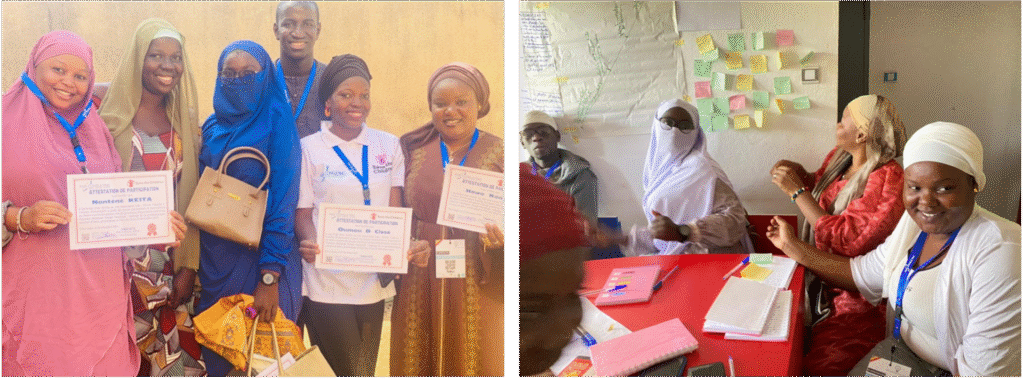
The problem and Motivation Behind:
“We have to wake up very early, like 4 a.m., and go to the hospital if you want to have the opportunity to see a healthcare provider … the current healthcare system is not only inefficient — it creates stress and delays, especially for vulnerable groups like the elderly and civil servants with fixed working hours. On top of that, paper tickets often contain errors, leaving patients wandering around hospitals, not knowing where to go or whom to meet.” – Oumou.
Oumou Boubou Cissé (21-year-old) grew up in Ségou, Mali where she witnessed firsthand how her family struggled with accessing healthcare. They were given incorrect tickets, forcing them to spend an entire day at the hospital searching for the right doctor. This frustration of lost time and confusion to access healthcare services inspired Oumou and her team to find a more efficient way to manage healthcare appointments.
The Innovative Solution:
“Our solution is a digital ticket. Through our app, you can set an appointment, and once you go to the hospital, you show that ticket to any healthcare provider. This way, there will no longer be long queues.” – Oumou.
When Oumou and her team joined the Youth Innovation Lab (YIL), they chose to tackle the pressing issue of limited access to healthcare services, particularly the frustration of long queues and inefficient appointment systems in hospitals. Through a Design Thinking approach, they began by conducting interviews with patients and healthcare staff to better understand their day-to-day challenges. Through this process, they discovered that the inefficiency of traditional ticketing systems was a key barrier, causing delays, confusion, and crowding in health facilities.
In response, they developed a prototype for Kenéya Blon, a health mobile application designed to streamline hospital access by providing digital appointment tickets. The app allows users to book medical appointments online and instantly receive a digital ticket containing the doctor’s name, appointment time, and specific hospital location. The app also sends booking confirmations and reminders, helping patients arrive on time and prepared.
When the team tested their prototype, feedback from patients was overwhelmingly positive. Users appreciated the ability to avoid early morning queues and reduce the confusion often experienced at hospitals. They also suggested integrating a secure and reliable payment system, leading the team to explore partnerships with Orange Mali for integration with Orange Money[1].
In addition to developing the prototype, the team has identified key stakeholders, including healthcare institutions and telecom partners, to ensure the app’s smooth rollout and financial sustainability.
Lessons Learned and Addressing Challenges:
“Thanks to the lab, Design Thinking was really important. You can have an idea, but you need to craft it. You need design thinking to turn that idea into a concrete product… I learned also how to work as a team member and create our own projects. It also helped me open my mind and listen to others without criticism.” – Oumou.
The Youth Innovation Lab provided Oumou and her team with trainings on design thinking, teamwork, and project management. They learned the value of brainstorming and collaboration, allowing her to refine her project ideas with input from her peers.
Reflecting on her learning, Oumou identified a key lesson learned from her experience:
- Seeking investors and partners is essential to bring their solution to life: The main challenge for Oumou and her team has been securing funding to develop the full version of the app. Despite having a clear vision and community support, the team needs 7 million CFA francs (about $11,700) to complete the app development and cover marketing expenses. Currently, Oumou and her team seek investors and partners who can provide them with access to finance and technical support to ensure smooth implementation and user adoption.
Next steps and Future Aspirations:
Oumou and her team are determined to continue developing Kenéya Blon, aiming to make it accessible to healthcare facilities across Mali. Their future plans include:
- Raising funds and investments: Getting access to finance to be able to build and run the app.
- Completing the app development: Ensuring the interface is user-friendly and fully integrated with healthcare systems.
- Marketing the app: Raising awareness through community outreach and social media.
- Expanding partnerships: Working with local hospitals and health centres to implement the system.
[1] A digital payment and money transfer service.